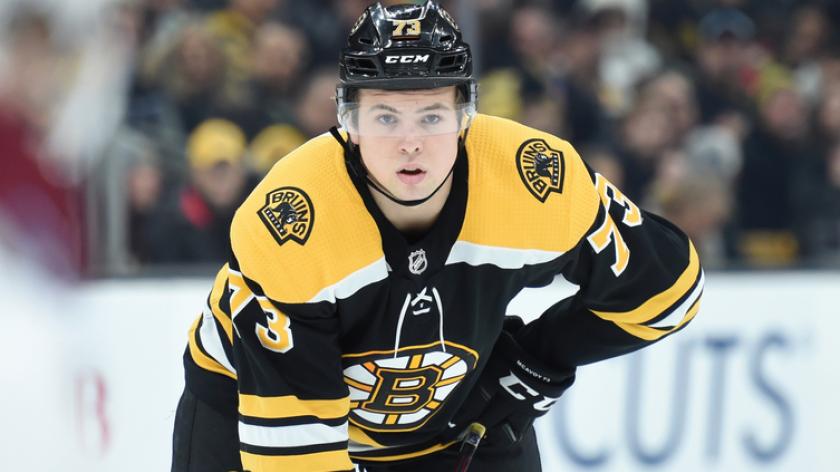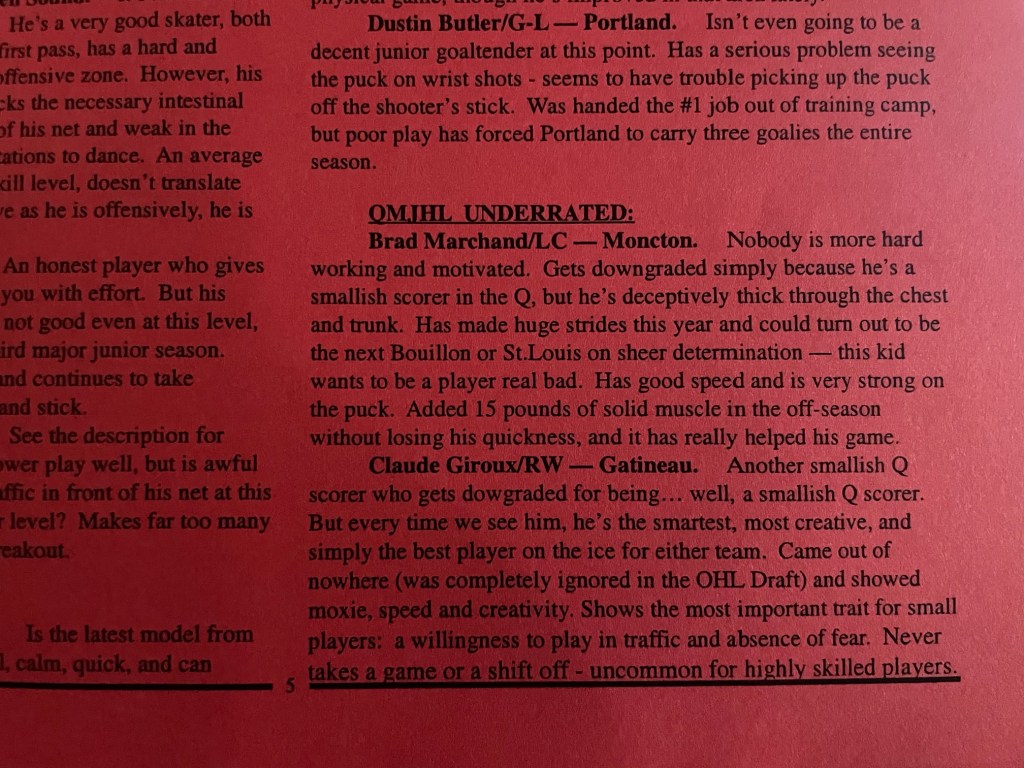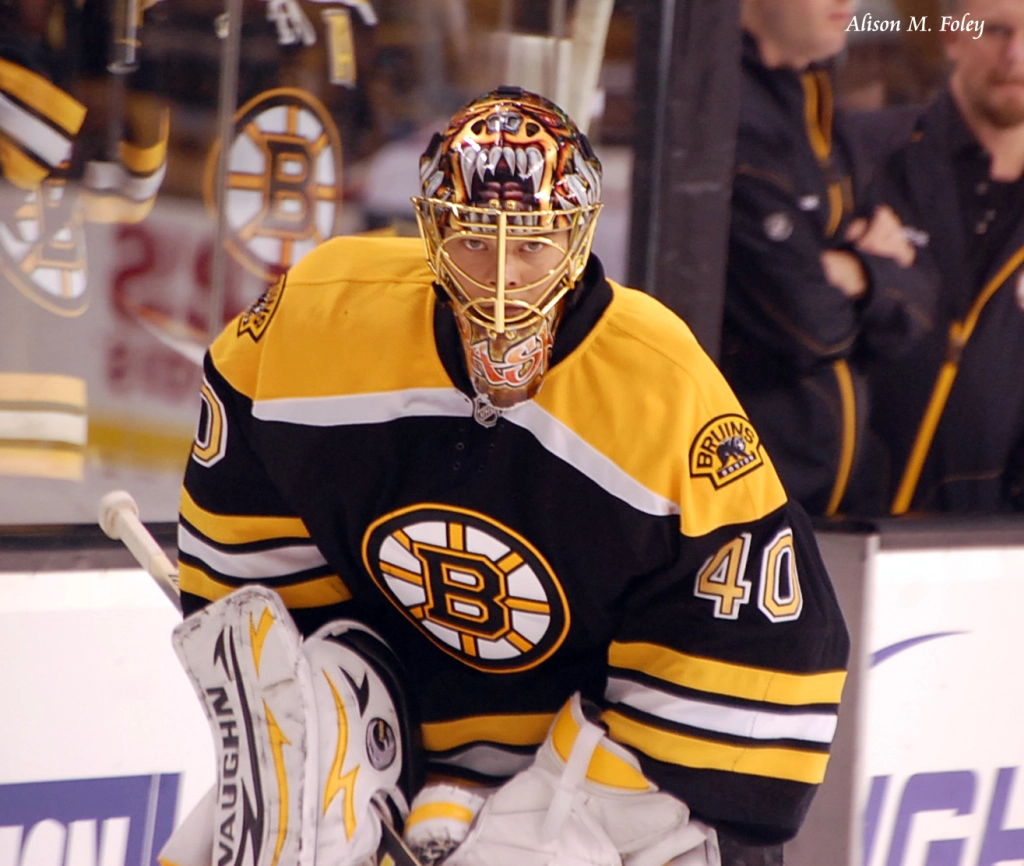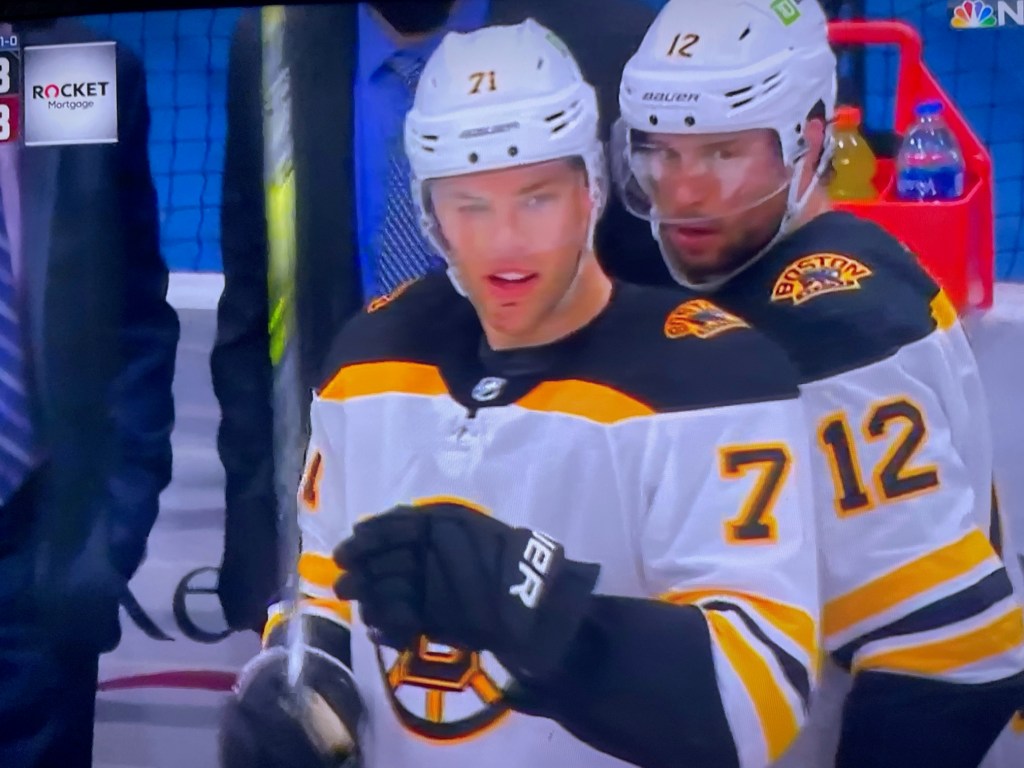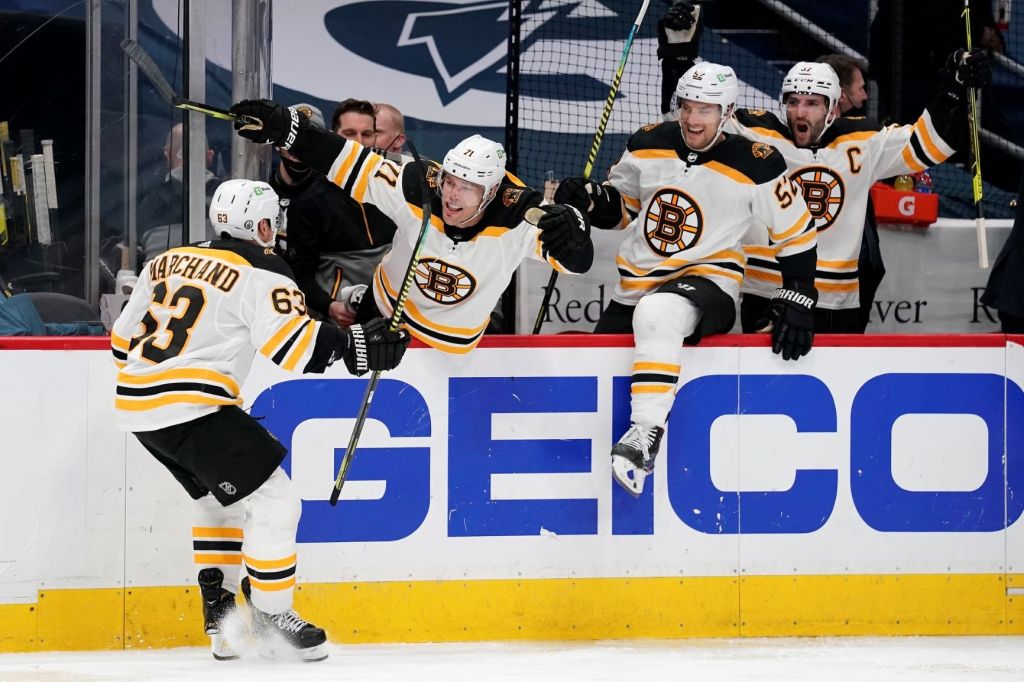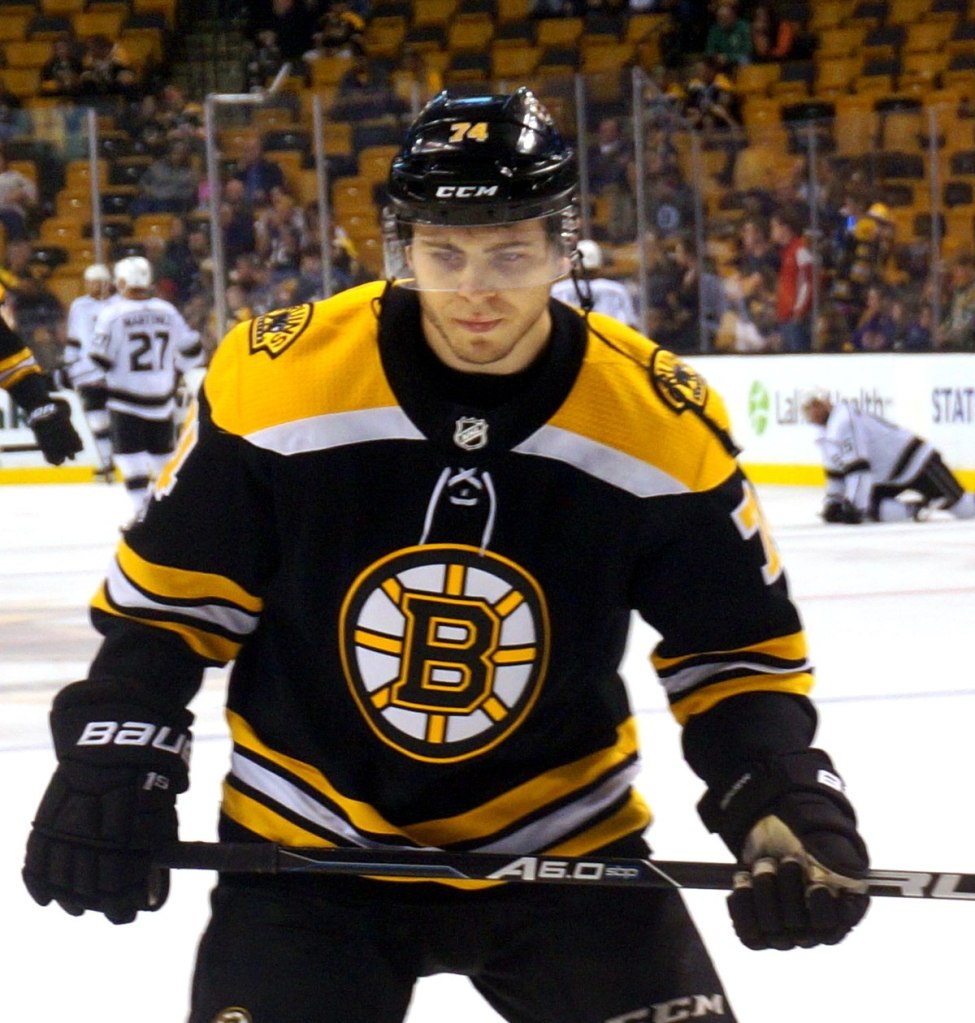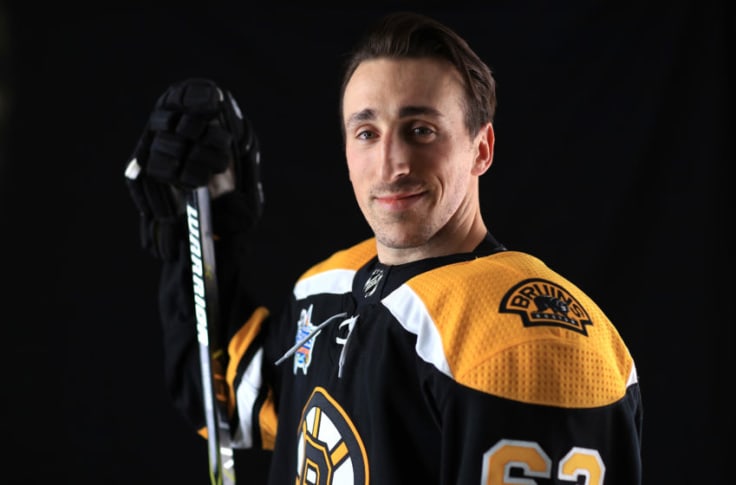
Brad Marchand is a winner.
In Game 3, with the scored deadlocked at 1-1 and the ice tilted against the Boston Bruins early in the extra frame in their second-round series against the NY Islanders, Marchand took a Charlie McAvoy pass inside the offensive blue line, skated down the left wall and zipped a high shot that whizzed over Islanders goalie Semyon Varlamov’s shoulder, hit the corner of the far post and crossbar and ricocheted down and into the cage.
Boom.
Just like that, a game that the Bruins deserved to win in regulation, but had lost all momentum in late and in the early minutes of overtime, was over on Marchand’s fifth goal (in 8 playoff games) and third career playoff sudden death tally.
It moved him into a tie with Mel “Sudden Death” Hill, for second all-time in franchise history. Keep in mind- Hill scored all three of his OT goals in the same 1939 semifinal playoff series against the NY Rangers, getting extra session strikes in Games 1 and 2, then the deciding triple OT tally in Game 7. The B’s went on to win the Stanley Cup.
One could argue, that given how much more jump the Islanders had in overtime last night, Marchand’s goal was the embodiment of the term- sudden death. Just like that, it was over, as No. 63 circled the net, arms raised and fists pumping the air, while Islanders forward Kyle Palmieri (who scored his own wondrous OT snipe in Game 1 of the 2021 playoffs against the Pittsburgh Penguins and Tristan Jarry) looked on in dejected befuddlement.
“Any puck, especially in overtime, has a chance to go in,” Marchand said. “Can’t pass up a shot, and that’s another example of it. I tried to get it on net and it found its way in.”
How did that go in?
How. Did. That. Go. In?
Short answer is: It’s hockey.
Longer answer: Shooters shoot, and winners win.
Even longer one: The Bruins lead their series 2 games to 1 with a chance to go up 3-1 on Long Island Saturday night.
Marchand has been helping the Bruins win big hockey games in spring for a decade now- he arrived in 2011 and his performance in the Stanley Cup Final series against the Vancouver Canucks keyed Boston to its first championship parade in 39 years. The B’s haven’t won another one since, but two other trips to the final and 102 career playoff points, puts Marchand in select company with current teammates David Krejci and Patrice Bergeron. They are the NHL’s only active trio with more than 100 career playoff points, a nod to just how good this Bruins organization has been since the three of them started playing full-time on the roster in 2010-11.
Marchand is highly polarizing, having entered the league as a rat who stirred up controversy in junior as a skilled, productive player who didn’t always put the best interests of the team ahead of his own. In the years since he established himself first on the B’s bottom line before working himself into bona fide NHL superstar status and the first player since Joe Thornton in 2003 to notch a 100-point season two years ago, Marchand has grown and matured. He’s always been a good guy and teammate, it’s just that most outsiders didn’t know it. Like many young, even immature players with a chip on their shoulder- and Marchand had a big chip as a player who had first-round talent but slipped to the third round of the 2006 NHL draft- the public persona didn’t jive with who he was behind the scenes in Boston.
He’s no saint- some of the things he did earlier in his NHL career were unacceptable and hurt people. The league held him accountable for that and he paid a price for it. And while some would say it wasn’t enough, that was how the NHL chose to handle things. You can’t defend it, but you can at least acknowledge that for the most part, he changed the way he plays.
Several things did not change, however: Marchand always put in the work. He practiced and played hard. And, as his career progressed, the results followed. After developing a reputation as a pure agitator (read: dirty player that everyone loves to hate), along with a penchant for streaky scoring in his first several seasons, Marchand has toned the self-destructive on-ice behavior down while growing into one of the most consistent and dangerous scorers in the NHL over the past five years. It didn’t happen overnight, and there are times when he can be pulled down into the kind of negative shenanigans that don’t help, but last night was a microcosm of who he is as a 33-year-old veteran and one of Boston’s purest clutch players, not only in the modern era, but perhaps of all time.
Marchand knows he plays on the edge and that sometimes, his emotions and the devil on his shoulder get the best of him. Last night, he took another bad penalty. But, the Boston PK had his back and killed it. He then returned the favor with a shot that ended the debate about who was the better team on this night.
The OT goal was the second of this spring for Marchand- he tallied in Game 2 against Washington. It’s just the third of his career, but is proof that he’s a worthy addition of Krejci (whose 120 career playoff points lead the current B’s and are second only to Hall of Fame icon Ray Bourque) and Bergeron (who has 119 points and leads the Boston franchise with four career OT strikes in the postseason).
Boston fans no doubt relish that the rest of the NHL let out a collective groan, perhaps threw their TV remote, or kicked a chair when Marchand’s shot went in last night. Anyone but him…please, Hockey Gods…anyone but HIM!
And, as great as the shot was, you can’t really fault Varlamov. Craig Smith’s first period goal on a nifty feed from Taylor Hall was an absolute bullet. The ghost of Terry Sawchuk, Patrick Roy AND Martin Brodeur all in the crease together wouldn’t have stopped that shot. After that, it was lights out for the rest of the 60-minute contest.
He was tremendous in regulation, especially in the third period, when the B’s were peppering him with shots from all areas of the ice, but he held his team in, long enough for Mat Barzal to score his first goal of the playoffs to tie it with some 5 minutes and change left in the game. It was a nice play by Barzal, but let’s be honest- Connor Clifton took the wrong angle and Chris Wagner stood beside him and ineffectively reached in with his stick rather than put his body into Barzal and knock him away from the doorstep. But hey- credit where due. Barzal is one player you don’t want to let whack away at a puck in tight and he made the most of the time and space he was given.
After that, the Islanders seized momentum and were helped by a mind-numbingly bad Sean Kuraly cross-checking penalty on Palmieri with 2:15 remaining in the third. Even if Palmieri got away with something in a battle seconds earlier, Kuraly who is rapidly burning away the goodwill of past strong playoff performances (exhibit A for why you don’t pay a lot to role players for past performances, btw), had no excuse for putting his team in that spot.
Thanks to Tuukka Rask, whom we haven’t yet mentioned in this space today, but who got his 6th win with some tremendous saves late and in OT on Barzal, the score remained tied, setting the stage for Marchand’s heroics.
“That one from there finally found its way in,” Bruce Cassidy quipped, underscoring the volatile nature of a playoff game in the NHL.
Marchand finished third in regular season scoring and won some respect and consideration for league MVP honors, even though he has no shot to beat out Connor McDavid. He’s fast, hard, skilled and most of all- productive. He’s the one player that fans around the league will scream about never wanting on their team publicly, but secretly would kill for. He’s on a great contract, and like Bergeron, is playing better hockey in his 30’s than he did in his 20’s.
Winners win.
Brad Marchand is a winner.
***
Brandon Carlo exited the game after taking a hit from Islanders grinder Cal Clutterbuck. Boston’s update on him after the game sounded optimistic, but make no mistake- if the big, mobile shutdown D is out for an extended period of time, the B’s will have their hands full. Assuming he can’t go, and that’s probably the right answer based on what we know. That means Jarred Tinordi or Urho Vaakanainen is next man up.
Game 2 goat (not the Tom Brady kind of GOAT) Jeremy Lauzon rebounded from a tough Game 2 with a solid defensive performance and no glaring mistakes or miscues. He has to keep things simple and the coaches showed a lot of trust in him to go back with No. 55. Trust…key word. Young players and fans don’t always understand that when it comes to hockey and coaching, trust is pretty much it. You want to play more? Earn your coach’s trust. You want to play less or not at all? Break that trust. That’s it. So, when fans get on social media and want to know why the B’s could possibly give Lauzon another shot in the lineup after so disastrous an outcome the game before, there’s your answer. They trust him. You aren’t there. Neither am I. None of us save those in the Bruins room knows or understands. So, you may not like it, but the world doesn’t work the way we want it to, sometimes. Cassidy and Co. trust Lauzon. For better or worse. And last night, he rewarded that trust.
Elsewhere in the NHL…
Three jeers for the league in giving Winnipeg Jets veteran Mark Scheifele a four-game suspension for his charge on Montreal’s Jake Evans Wednesday night. Look, it was an unnecessary hit, and you could even be justified in calling it a bad hit, but the outcome is what is being judged here. If you have to suspend him, and the NHL probably did given the outrage, give him a game and move on. But the farce of this all is that this same league watched Washington’s Tom Wilson grab a star player from behind, slam him to the ice, end his season, then mock the response and show zero contrition. The league’s response? A $5,000 fine…and the scorn and figurative black eye for another mind-numbingly incomprehensible decision.
With supplemental disciplinary decisions like this one, clearly aimed to address the abject failure of dealing with Wilson vs. Artemi Panarin, where the NHL failed to protect one of its own, you can’t help but feel that Director of Player Safety George Parros was under orders on this one to make an example out of Scheifele, but if that is indeed the case here, it’s a massive and unjust overcorrection. We all feel for Evans, but we felt for Panarin, too. What about Carlo? His suffering and loss of games to another concussion from Wilson’s forearm to the head was deemed worthy of a seven-game ban for a known and repeat offender. Now, every time Carlo takes a hit, we have to hold our collective breath, wondering if this could be it for his career. He’s 24 years old, by the way.
The NHL’s real efforts need to be on changing the culture. Scheifele has not made a career of running guys and injuring them. He made a mistake and will now pay for it. But what message does that send to the nimrods of the league who repeatedly cross the line and see no major impact to their livelihood?
We look forward to a 25+-game ban for Wilson the next time said repeat offender hurts someone. After all, a player with no track record like Scheifele got four games for his first offense, right? Sadly, not holding our breath on that one… The Capitals and NHL by extension, have been enablers for Wilson’s antics and he shows little sign that he’s going to change his ways.




